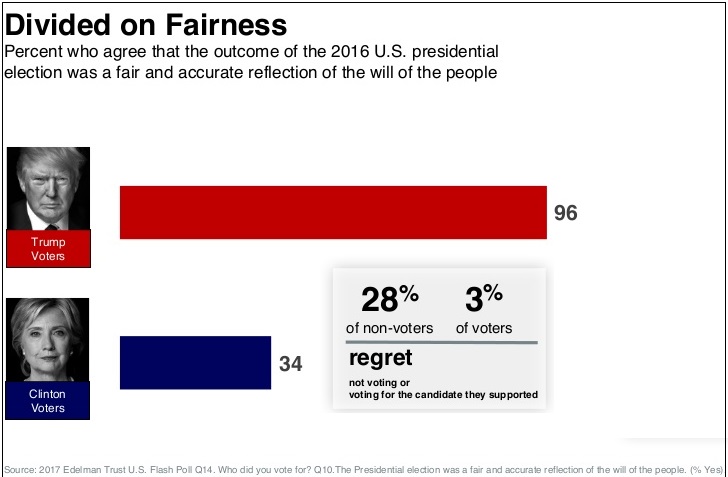Long before Republican Donald Trump was sworn in as president January 20 and began upending conventional norms of government and harshly rewriting U.S. policy on immigration, trade and the environment, people throughout the world were voicing a shocking disdain for political and business leaders and institutions of all stripes.
The 2017 edition of the Edelman TRUST BAROMETER – a long-standing annual measure of worldwide opinion – has revealed what its authors described as “the largest-ever drop in trust across the institutions of government, business, media and NGOs.”
Related: Trump May Try to Weed Out Immigrants Who Cost Taxpayers $279 Billion Annually
The news media -- which was caught by surprise by Trump’s stunning presidential victory and the Brexit vote in Great Britain to leave the European Union – suffered the biggest beating in the new survey, with just a 43 percent trust level among the public. Governments and their leaders didn’t fare any better at 41 percent, which made them “the least trusted institution” in half of the 28 countries that were surveyed on-line or the project.
Compounding the gloom, the Trust Barometer “found that 53 percent of respondents believe the current overall system of governments and institutions has failed them and offer little hope for the future, according to the authors.
“The implications of the global trust crisis are deep and wide-ranging,” wrote Richard Edelman, president and CEO of Edelman, a prominent global communications marketing firm. “It began with the Great Recession of 2008, but like the second and third waves of a tsunami, globalization and technological change have further weakened people’s trust in global institutions. The consequence is virulent populism and nationalism as the mass population has taken control away from the elites.”
Related: Mark Cuban: Trump's Immigration Ban Is Bad for Business
Nowhere is this trust deficit and deep fracturing of the voters more pronounced than in the U.S. in the wake of the historic 2016 presidential election. In a special section of the Trust Barometer survey focusing on the U.S., the pollster documented the profound chasm separating attitudes and the mindset of Trump supporters and those who voted for Democrat Hilary Clinton.

On the most fundamental question of whether people accept Trump’s presidency as legitimate (after revelations of Russian interference and FBI Director James Comey’s startling last-minute public statements on the status of Clinton’s email investigation era), 96 percent of Trump supporters said the election outcome was a “fair and accurate” reflection of the will of the people, while only 34 percent of Clinton supporters agreed with that statement.
Moreover, 77 percent of Trump voters said they trust the new administration to do what is right, while a mere eight percent of Clinton supporters feel the same way. At the same time, there appears to be widespread remorse among many who didn’t bother to vote. Twenty-eight percent of all those surveyed said they regretted having stayed home that day.
Clinton lost in part because she couldn’t attract younger voters to her side, many of whom preferred Sen. Bernie Sanders (I-VT) or some third party candidate. Now 43 percent of millennials, the young Americans just now coming into their own, said they regretted their decision to skip the election.
Related: Could Trump’s Attack on Sanctuary Cities Trigger a Tax Revolt?
But for all of the differences between Trump and Clinton backers, there were also some similarities.
One surprising finding was that the demographic divide was not as great as one might imagine. A third of Trump and Clinton voters have annual incomes of $100,000 a year or more, and little more than half of the two groups are college educated. Still, Trump voters were more likely to be white, male and over 50 years of age than Clinton’s supporters.
And while the two sides were in agreement on policy priorities more often than not, there were still some important differences in their attitudes.
There is strong support among Trump and Clinton partisans alike for holding corporate executives accountable for business scandals and financial meltdowns (roughly 80 percent of both sides agree) and allowing the government to regulate the pharmaceutical industry and pass legislation to address climate change (roughly 63 percent of Trump and Clinton voters agree).
However, Trump backers are far more protectionist on trade issues than the Democrats are, and they favor the new president tearing up long-standing trade agreements like NAFTA. Trump supports are also far more fearful of immigration and globalization than Clinton backers.
Finally, the survey makes it clear that Trump supporters heartily share the new president’s contempt for the media and are far more inclined than Clinton voters to find a way to regulate or rein in news organizations.





